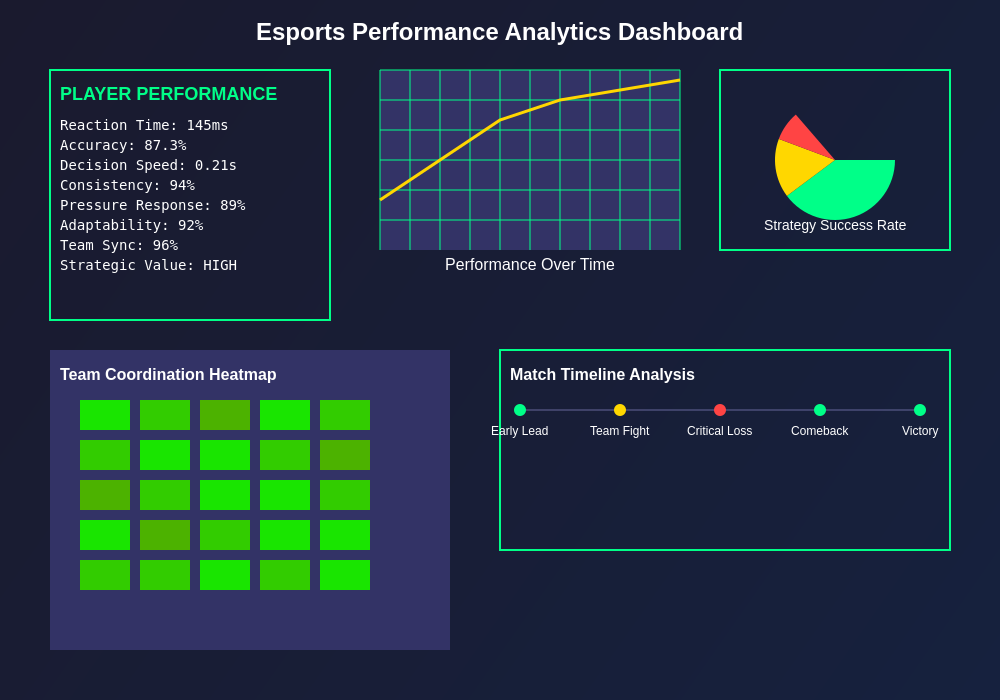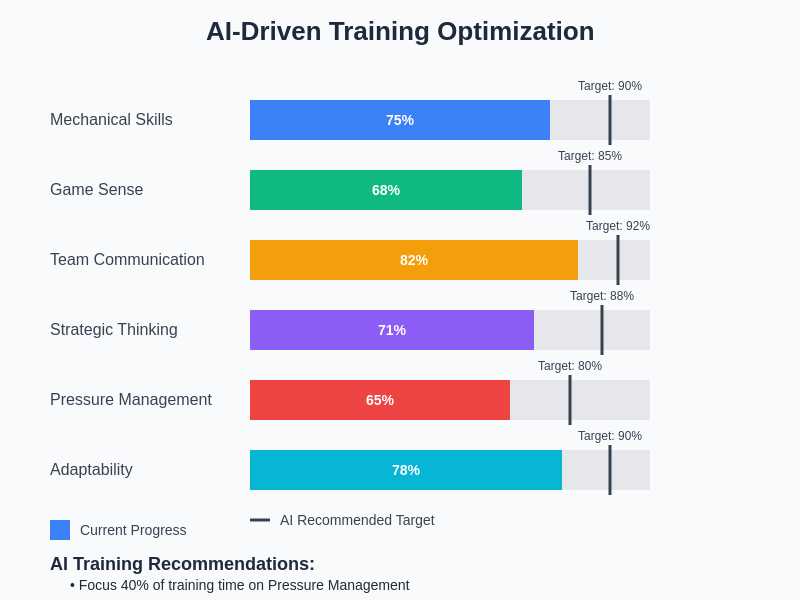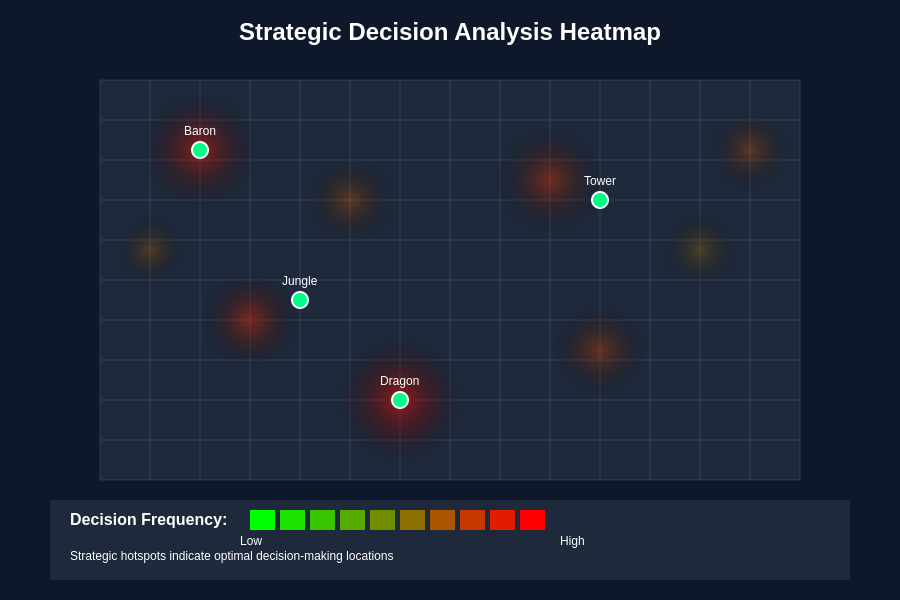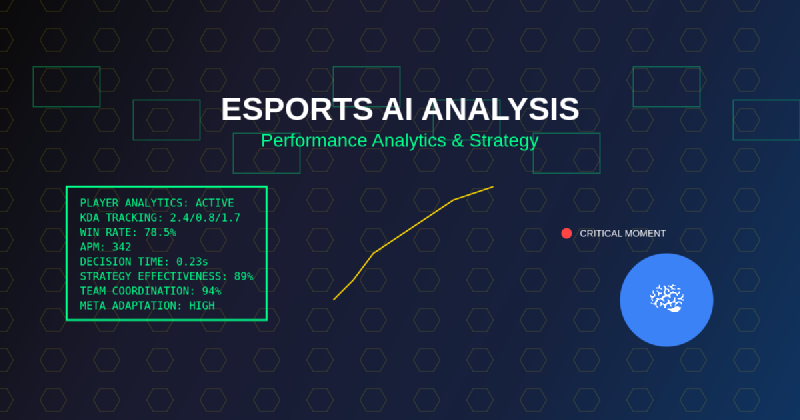The convergence of artificial intelligence and competitive gaming has ushered in a revolutionary era for esports, fundamentally transforming how players, coaches, and organizations approach performance optimization and strategic development. This technological evolution has created unprecedented opportunities for data-driven insights that extend far beyond traditional statistical analysis, offering comprehensive understanding of gameplay patterns, opponent behavior, and strategic effectiveness across multiple gaming titles and competitive formats.
Explore the latest AI trends in gaming and esports to stay informed about cutting-edge developments that are reshaping competitive gaming landscapes. The integration of sophisticated analytical frameworks into esports represents a paradigm shift that mirrors the data revolution experienced in traditional sports, yet with unique complexities and opportunities specific to digital competition environments.
The Evolution of Esports Analytics
The transformation from intuition-based decision making to data-driven strategic approaches in esports has been remarkable, with artificial intelligence serving as the catalyst for this fundamental shift. Traditional esports analysis relied heavily on manual observation, basic statistical tracking, and subjective assessment of player performance, creating significant limitations in understanding the complex interdependencies that define successful competitive gameplay. The introduction of AI-powered analytical systems has eliminated these constraints by providing real-time processing of massive datasets that encompass every aspect of competitive performance.
Modern esports AI analysis platforms can simultaneously track hundreds of variables including player movement patterns, reaction times, resource management efficiency, strategic decision timing, and team coordination metrics. This comprehensive data collection enables the identification of subtle performance indicators that would be impossible for human analysts to detect through traditional observation methods. The result is a level of analytical depth that provides competitive teams with actionable insights for improving individual player performance and collective strategic execution.
Advanced Performance Metrics and Player Assessment
The sophistication of contemporary esports analytics extends far beyond simple kill-death ratios or win percentages, incorporating complex algorithmic assessments that evaluate multidimensional aspects of player performance. AI systems can analyze micro-movements, decision-making patterns, and situational awareness to create comprehensive player profiles that identify strengths, weaknesses, and improvement opportunities with unprecedented precision. These systems utilize machine learning algorithms trained on extensive datasets from professional matches to establish performance benchmarks and identify optimal gameplay patterns.
Performance analytics now encompass psychological factors such as pressure response, consistency under varying circumstances, and adaptability to different strategic contexts. AI algorithms can detect subtle changes in player behavior that indicate fatigue, stress, or declining performance before these issues become apparent through traditional metrics. This predictive capability enables coaches to make informed decisions about player rotation, training focus, and strategic adjustments that optimize team performance across extended competitive periods.
Enhance your analytical capabilities with Claude for comprehensive esports data processing and strategic insight generation that transforms raw gameplay data into actionable competitive intelligence. The integration of advanced AI systems provides teams with the analytical sophistication necessary to compete at the highest levels of professional esports competition.
Strategic Pattern Recognition and Opponent Analysis
One of the most transformative applications of AI in esports involves the automated recognition of strategic patterns and opponent behavioral analysis that provides teams with significant competitive advantages. Machine learning algorithms can process extensive historical data from opponent matches to identify recurring strategic preferences, tactical tendencies, and situational decision-making patterns that inform counter-strategy development. This level of opponent intelligence gathering was previously impossible due to the sheer volume of data required for meaningful analysis.
AI systems can identify subtle strategic patterns that extend across multiple matches and tournaments, revealing long-term strategic evolution and adaptation patterns that inform predictive modeling of opponent behavior. These insights enable teams to prepare more effectively for specific opponents by developing targeted strategies that exploit identified weaknesses or counter anticipated tactical approaches. The result is a more sophisticated level of strategic preparation that mirrors the analytical depth found in traditional professional sports.

The visualization of complex performance data through AI-powered dashboards provides coaches and players with intuitive access to sophisticated analytical insights that drive strategic decision-making and performance optimization efforts.
Real-Time Decision Support and Live Match Analysis
The integration of AI systems into live match environments has created opportunities for real-time strategic adjustment and decision support that significantly enhance competitive performance. Advanced analytics platforms can process live match data to identify emerging patterns, strategic opportunities, and potential threats as they develop during competitive play. This real-time analytical capability enables coaches to provide more informed guidance to players and make strategic adjustments based on quantitative assessment of match progression.
Live match AI analysis can identify moments when strategic pivots would be most effective, predict opponent tactical responses to specific scenarios, and recommend resource allocation strategies that maximize competitive advantage. These systems operate at speeds that far exceed human analytical capabilities, providing teams with strategic insights that can influence match outcomes through more informed decision-making during critical competitive moments.
Team Coordination and Communication Analysis
The complex nature of team-based esports requires sophisticated coordination and communication patterns that AI systems can analyze to identify optimization opportunities and performance enhancement strategies. Machine learning algorithms can evaluate communication effectiveness, coordination timing, and strategic execution synchronization to provide teams with detailed feedback on collaborative performance aspects. This analysis extends beyond simple communication frequency to encompass communication quality, timing effectiveness, and strategic information sharing patterns.
AI systems can identify communication patterns that correlate with successful strategic execution, enabling teams to optimize their coordination protocols for maximum effectiveness. These insights help teams develop more efficient communication strategies that reduce information overload while ensuring critical strategic information reaches relevant team members at optimal times. The result is improved team coordination that translates directly into enhanced competitive performance.
Utilize Perplexity for comprehensive esports research to gather detailed information about competitive gaming trends, strategic innovations, and analytical methodologies that inform advanced performance optimization efforts.
Predictive Modeling and Match Outcome Forecasting
The application of predictive modeling in esports has reached sophisticated levels that enable accurate forecasting of match outcomes based on comprehensive analysis of team performance metrics, strategic tendencies, and historical competitive data. AI algorithms can process vast amounts of historical match data to identify patterns and correlations that inform probabilistic assessments of competitive outcomes under various scenarios. These predictive models consider factors including recent performance trends, head-to-head historical data, strategic compatibility, and environmental variables that influence competitive performance.
Advanced predictive systems can generate scenario-based forecasting that evaluates potential outcomes under different strategic approaches, enabling teams to optimize their preparation and strategic planning for maximum competitive advantage. These models continuously learn from new match data, improving their accuracy and providing increasingly sophisticated insights that inform strategic decision-making at the highest levels of competitive play.
Training Optimization and Skill Development
AI-driven training optimization has revolutionized how esports professionals approach skill development and performance enhancement, providing personalized training recommendations based on detailed analysis of individual player strengths, weaknesses, and improvement potential. Machine learning algorithms can analyze practice session data to identify specific areas where focused training would yield the greatest performance improvements, enabling more efficient use of limited practice time and resources.
Training optimization systems can generate customized practice scenarios that target specific skill deficiencies while reinforcing existing strengths, creating more effective training programs that accelerate player development. These systems can also monitor training progress and adjust recommendations based on observed improvement patterns, ensuring that training efforts remain optimally focused on areas with the greatest potential for performance enhancement.

Comprehensive training analytics provide detailed insights into skill development patterns, practice effectiveness, and performance improvement trajectories that guide optimized training program development.
Meta-Game Analysis and Strategic Evolution
The dynamic nature of competitive gaming requires continuous adaptation to evolving meta-game trends and strategic innovations that AI systems are uniquely positioned to analyze and predict. Machine learning algorithms can process data from thousands of matches across different competitive levels to identify emerging strategic trends, evaluate the effectiveness of new tactical approaches, and predict future meta-game evolution. This analysis provides teams with early insights into strategic innovations that may become dominant in future competitive periods.
Meta-game analysis extends beyond simple strategy identification to encompass comprehensive evaluation of strategic effectiveness across different competitive contexts, player skill levels, and tournament formats. AI systems can identify strategies that may be effective in specific situations while recognizing their limitations in other contexts, enabling teams to develop more nuanced strategic approaches that optimize performance across varied competitive scenarios.
Tournament Bracket Analysis and Strategic Planning
The complexity of tournament structures and bracket progression creates strategic considerations that AI systems can analyze to optimize team preparation and resource allocation strategies. Advanced analytics can evaluate bracket structures, opponent likelihood scenarios, and strategic implications of different tournament progression paths to inform preparation priorities and strategic focus areas. This analysis enables teams to optimize their preparation efforts by focusing on the most probable opponent scenarios while maintaining flexibility for unexpected bracket developments.
Tournament analysis systems can evaluate the strategic implications of different seeding positions, identify optimal paths through tournament brackets, and recommend strategic approaches that maximize advancement probability under various competitive scenarios. These insights enable teams to approach tournaments with more sophisticated strategic planning that considers both immediate match preparation and longer-term tournament progression objectives.
Performance Psychology and Mental State Analysis
The integration of psychological analysis into esports performance evaluation represents a frontier where AI systems provide unprecedented insights into mental state factors that significantly influence competitive performance. Advanced analytics can identify behavioral patterns that indicate confidence levels, stress responses, and psychological resilience under competitive pressure. These insights enable more comprehensive player development programs that address both technical skills and mental performance factors.
AI systems can analyze communication patterns, decision-making speed, and strategic risk-taking behavior to assess psychological state changes that may impact performance. This analysis provides coaches with valuable information for managing player psychology during high-pressure competitive situations and optimizing team mental preparation strategies for maximum competitive effectiveness.

Heat map analysis of strategic decision patterns reveals optimal timing for tactical adjustments and resource allocation strategies that maximize competitive advantage across different match scenarios.
Economic and Roster Management Analytics
The business aspects of professional esports have been enhanced through AI-driven analytics that evaluate player value, roster optimization, and economic decision-making strategies. Advanced systems can analyze player performance relative to compensation, evaluate trade scenarios, and assess roster composition effectiveness to inform management decisions that optimize both competitive performance and economic efficiency. These analytics provide esports organizations with data-driven insights for making strategic roster decisions that balance performance objectives with financial constraints.
Economic analytics can evaluate the return on investment for different player acquisitions, training programs, and strategic initiatives to optimize resource allocation across organizational objectives. These insights enable more sophisticated business decision-making that considers both immediate competitive impact and longer-term organizational development objectives.
Integration with Streaming and Content Creation
The convergence of competitive performance and content creation has created opportunities for AI systems to optimize both competitive preparation and audience engagement strategies simultaneously. Advanced analytics can identify performance moments that generate high audience engagement, evaluate strategic decisions that enhance viewing experience, and optimize content creation strategies that balance competitive authenticity with entertainment value.
These systems can analyze viewer engagement patterns relative to different types of gameplay content, enabling content creators to optimize their streaming strategies while maintaining competitive performance standards. The result is more sophisticated approaches to balancing professional competitive commitments with content creation opportunities that maximize both competitive success and audience development.
Future Developments and Technological Integration
The continued evolution of AI technology promises even more sophisticated analytical capabilities that will further transform esports performance optimization and strategic development. Emerging technologies including advanced computer vision, natural language processing, and predictive modeling capabilities will enable more comprehensive analysis of competitive performance factors that are currently difficult to quantify systematically.
Future developments may include real-time strategic recommendation systems that provide live coaching assistance, advanced opponent modeling that predicts strategic adaptations, and comprehensive performance optimization systems that integrate physical, mental, and strategic factors into unified analytical frameworks. These technological advances will continue to push the boundaries of what is possible in competitive gaming performance optimization.
The integration of virtual reality and augmented reality technologies with AI analytics may create new training methodologies that provide more immersive and effective skill development experiences. These innovations will likely transform how esports professionals approach training, strategic preparation, and performance optimization in ways that are currently difficult to imagine but will undoubtedly reshape the competitive gaming landscape.
Industry Impact and Competitive Evolution
The widespread adoption of AI analytics in esports has fundamentally altered the competitive landscape by raising performance standards and creating new requirements for competitive success at the highest levels. Teams that effectively integrate advanced analytics into their preparation and strategic development processes gain significant competitive advantages that are difficult to overcome through traditional training methods alone. This technological arms race has created pressure for all competitive teams to adopt sophisticated analytical approaches or risk being left behind by more analytically advanced competitors.
The democratization of analytical tools has also created opportunities for smaller organizations and individual players to access sophisticated performance optimization capabilities that were previously available only to well-funded professional teams. This leveling of analytical access has increased competitive parity in some respects while raising overall performance standards across the competitive gaming ecosystem.
Disclaimer
This article is for informational purposes only and does not constitute professional advice regarding esports training, strategic development, or competitive gaming. The views expressed are based on current understanding of AI technologies and their applications in competitive gaming environments. Readers should conduct their own research and consider their specific requirements when implementing AI-powered analytical tools for esports applications. The effectiveness of AI analytics may vary depending on specific games, competitive levels, and individual circumstances. Competitive gaming involves inherent risks and uncertainties that analytical tools cannot eliminate entirely.
